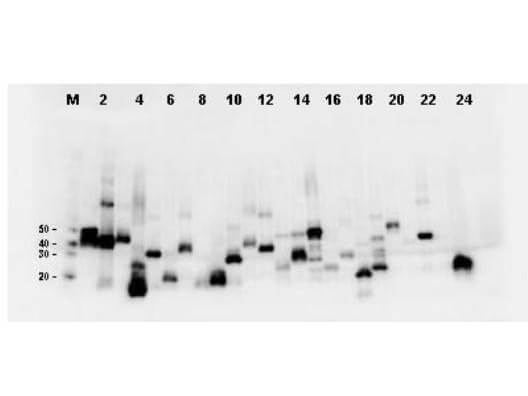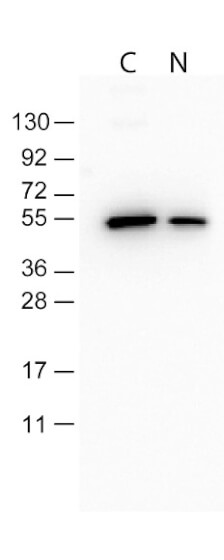Datasheet is currently unavailable. Try again or CONTACT US
DYKDDDDK Tag (Anti-FLAG®) Antibody
Mouse Monoclonal 29E4.G7 IgG2a kappa
8 References
200-301-383S
200-301-383
25 µL
100 µg
Liquid (sterile filtered)
Liquid (sterile filtered)
WB, ELISA, IF, FC, ChIP, IP
FLAG-Tag
Mouse
Shipping info:
$50.00 to US & $70.00 to Canada for most products. Final costs are calculated at checkout.
Product Details
Antibody for the detection of FLAG® conjugated proteins (MOUSE) Monoclonal Antibody - 200-301-383
mouse anti-FLAG™ tag, Enterokinase Cleavage Site (ECS), mouse anti-DYKDDDDK, Asp-Tyr-Lys-Asp-Asp-Asp-Asp-Lys
Mouse
Monoclonal
IgG2a
Target Details
FLAG-Tag
Conjugated Peptide
This antibody was produced in mice by repeated immunizations with a synthetic peptide corresponding to the FLAG™ epitope tag peptide DYKDDDDK (Asp-Tyr-Lys-Asp-Asp-Asp-Asp-Lys) conjugated to KLH using maleimide.
This product is an IgG fraction antibody purified from ascites by Protein A chromatography followed by extensive dialysis against the buffer stated above. The purified antibody is directed against the FLAG™ motif and is useful in determining its presence in various assays where the epitope tag is present at either the amino or carboxy terminus of recombinant proteins. This monoclonal anti-FLAG™ tag antibody detects over-expressed proteins containing the FLAG™ epitope tag. In western blotting of bacterial extracts, the antibody does not cross-react with endogenous proteins.
Application Details
ELISA, WB
ChIP, FC, IF, IP
- View References
Anti-FLAG has been tested by ELISA and western blot. Epitope tags are short peptide sequences that are easily recognized by tag-specific antibodies. Due to their small size, epitope tags do not affect the tagged protein’s biochemical properties. Most often sequences encoding the epitope tag are included with target DNA at the time of cloning to produce fusion proteins containing the epitope tag sequence. This allows anti-epitope tag antibodies to serve as universal detection reagents for any tag containing protein produced by recombinant means. This means that anti-epitope tag antibodies are a useful alternative to generating specific antibodies to identify, immunoprecipitate or immunoaffinity purify a recombinant protein. The anti-epitope tag antibody is usually functional in a variety of antibody-dependent experimental procedures. Expression vectors producing epitope tag fusion proteins are available for a variety of host expression systems including bacteria, yeast, insect and mammalian cells. Rockland Immunochemicals produces anti-epitope tag antibodies against many common epitope tags including Myc, GST, GFP, 6X His, MBP, FLAG™ and HA. Rockland Immunochemicals also produces antibodies to other tags including FITC, Rhodamine (TRITC), DNP and biotin.
Formulation
1.026 mg/mL by UV absorbance at 280 nm
0.02 M Potassium Phosphate, 0.15 M Sodium Chloride, pH 7.2
0.01% (w/v) Sodium Azide
None
Shipping & Handling
Dry Ice
Store vial at -20° C prior to opening. Aliquot contents and freeze at -20° C or below for extended storage. Avoid cycles of freezing and thawing. Centrifuge product if not completely clear after standing at room temperature. This product is stable for several weeks at 4° C as an undiluted liquid. Dilute only prior to immediate use.
Expiration date is one (1) year from date of receipt.
Antibody for the detection of FLAG™ recognizes FLAG™ and is optimally suited for monitoring the expression of FLAG™ tagged fusion proteins. Antibody for the detection of FLAG™ can be used to identify fusion proteins containing the FLAG™ epitope. Antibody for the detection of FLAG™ recognizes the epitope tag fused to either the amino- or carboxy- termini of targeted proteins. The epitope tag peptide sequence was first derived from the 11-amino-acid leader peptide of the gene-10 product from bacteriophage T7. DYKDDDDK is the most commonly used hydrophilic octapeptide tag.
Matsuoka H et al. (2020). Expression of p11 and Heteromeric TASK Channels in Rat Carotid Body Glomus Cells and Nerve Growth Factor–differentiated PC12 Cells. J Histochem Cytochem
Applications
IF, Confocal Microscopy
Skotnicka, D et al. (2020). CdbA is a DNA-binding protein and c-di-GMP receptor important for nucleoid organization and segregation in Myxococcus xanthus. Nature Communications
Applications
ChIP
Xu et al. (2017). Parvovirus B19 NS1 protein induces cell cycle arrest at G2-phase by activating the ATR-CDC25C-CDK1 pathway. PLOS Pathogens
Applications
FC, FACS, FLOW
Saha et al. (2017). Human adenovirus type 5 vectors deleted of early region 1 (E1) undergo limited expression of early replicative E2 proteins and DNA replication in non-permissive cells. PLOS One
Applications
WB, IB, PCA
Wu et al. (2016). Potassium and the K+/H+ Exchanger Kha1p Promote Binding of Copper to ApoFet3p Multi-copper Ferroxidase. Journal of Biological Chemistry
Applications
WB, IB, PCA
Turchinovich et al. (2016). Interference in transcription of overexpressed genes by promoter-proximal downstream sequences. Scientific Reports
Applications
WB, IB, PCA
Lee et al. (2015). Transcriptional regulation of Niemann-Pick C1-like 1 gene by liver receptor homolog-1. BMB Reports
Applications
WB, IB, PCA
Ortiz-Sandoval CG. Et al. (2014). Interaction with the effector dynamin-related protein 1 (Drp1) is an ancient function of Rab32 subfamily proteins. Cell Logist.
Applications
IP, Co-IP
This product is for research use only and is not intended for therapeutic or diagnostic applications. Please contact a technical service representative for more information. All products of animal origin manufactured by Rockland Immunochemicals are derived from starting materials of North American origin. Collection was performed in United States Department of Agriculture (USDA) inspected facilities and all materials have been inspected and certified to be free of disease and suitable for exportation. All properties listed are typical characteristics and are not specifications. All suggestions and data are offered in good faith but without guarantee as conditions and methods of use of our products are beyond our control. All claims must be made within 30 days following the date of delivery. The prospective user must determine the suitability of our materials before adopting them on a commercial scale. Suggested uses of our products are not recommendations to use our products in violation of any patent or as a license under any patent of Rockland Immunochemicals, Inc. If you require a commercial license to use this material and do not have one, then return this material, unopened to: Rockland Inc., P.O. BOX 5199, Limerick, Pennsylvania, USA.


